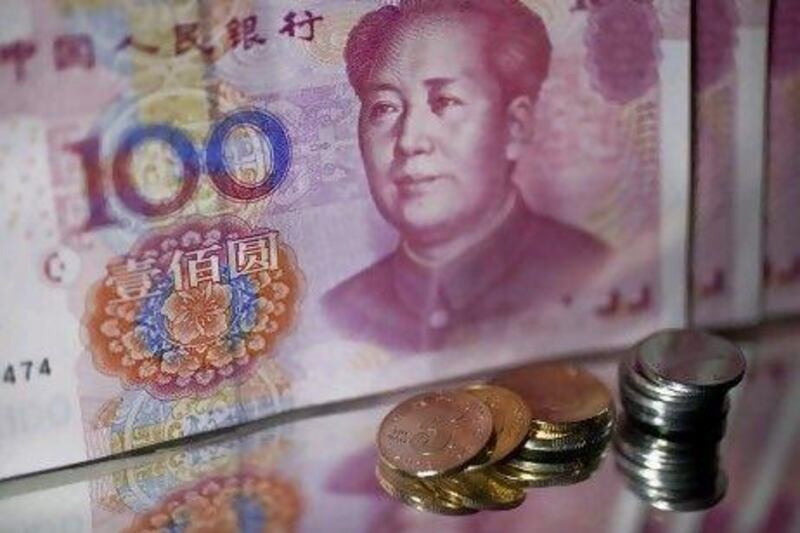The UAE Central Bank has held talks about buying Chinese assets as it mulls diversifying some of its foreign exchange reserves away from the US dollar.
Dragon Economy: Read more on the rise of the Yuan
Last Updated: May 29, 2011
Yuan poised to pressure the dollar China's economy is growing rapidly and as it does so its currency is playing an increasingly powerful role on the world stage but can it threaten the dollar's position? Read article
Better to be slow than sorry on the currency The great yuan conundrum. Read article
China fears soaring inflation could bring street protests Chinese authorities are anxious, since turbulent periods in country's history have often been linked to price rises. Read article
[ More Business ]
At present almost all the regulator's Dh183.1 billion (US$49.85bn) of foreign currency assets are denominated in dollars.
Any purchase of yuan-denominated bonds, equities or other assets would open the way for a greater use of the Asian giant's currency in trade and investment between China and the UAE.
Central Bank officials have held talks with Chinese officials about the possibility of investing in Chinese assets, according to a source familiar with the matter.
The Central Bank refused to comment on the issue, saying it would not discuss its reserves.
The regulator would first have to overcome barriers to investing in Chinese assets as Beijing tightly controls access to the country's financial markets.
"It's an interesting thing to watch," said Rachel Ziemba, a senior analyst at Roubini Global Economics. "If nothing else, it's a diversification and would make sense from the point of view that China in future will have a larger share of the global economy."
Hong Kong and Malaysia are among other central banks to purchase Chinese securities as they look to tap opportunities linked to the rise of the world's second-biggest economy.
Economists forecast the trend will continue as concerns about the widening US government deficit taint the outlook for the dollar as the globe's reserve currency.
The yuan is expected to appreciate against the greenback, stoking demand among investors for the Chinese currency. China is under pressure from the US to speed up the currency's appreciation amid accusations from some that the exchange rate is giving China an unfair advantage in global trade.
A report released by the US Treasury department on Friday said China was making insufficient progress in allowing the yuan to rise. China is keen to boost the yuan's use within finance and trade circles as it seeks to position the currency as a long-term rival to the dollar.
So far, no Middle East central banks are believed to have diversified their reserves into Chinese assets.
"China is gradually opening up its capital accounts to allow more trade to take place in the currency so there's no financial risk from exchange rates and transaction costs," said Gareth Leather, a China analyst at the Economist Intelligence Unit.
The UAE Central Bank's foreign currency assets reached Dh183.1bn in March, rising by 19.3 per cent in the past year, according to the latest data from the regulator.
More than 99 per cent of the regulator's assets, which are held in bonds, other securities and deposits, are dollar-denominated.
Holding dollar assets makes sense as the dirham, like the currencies of most other GCC states, is pegged to the greenback.
Oil and many other global commodities are also traded in dollars.
The Central Bank has previously talked about diversifying its reserves into other foreign currencies, with Sultan al Suwaidi, the Governor, saying in December 2006 the regulator planned to convert a small part of its reserves from dollars to euros.
Trade and investment ties between China and the UAE are growing, however.
Already the second-biggest exporter to Dubai, China is tipped to emerge as the GCC's biggest trading partner by 2020 as its demand for oil and other commodities increases, according to a report this month by the Economist Intelligence Unit.
The UAE is keen to boost trade and investment ties between the two economies further. Holding the yuan would open the way for a greater use of the currency in trade and investment between the two countries.
But in order to buy Chinese assets, the UAE would first need approval from Beijing.
Other central banks have registered for quotas under China's qualified foreign institutional investor (QFII) programme, which enables foreign investors to purchase equities and bonds on the mainland.
South Korea's central bank has applied to invest in yuan-denominated assets, it was reported this month.
Although China's financial markets remain largely off-limits to foreigners, the QFII programme allows several overseas investors to buy Chinese securities. The central banks of Hong Kong, Norway and Malaysia have gained quotas under the QFII programme.
China is slowly lifting capital controls on the yuan as it seeks to boost the use of the currency in international trade and cut the country's dependence on the dollar.





